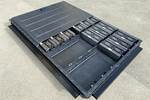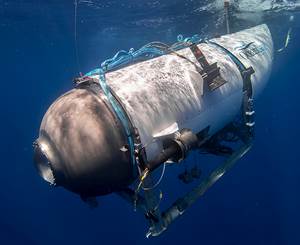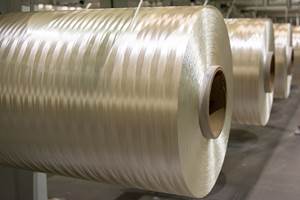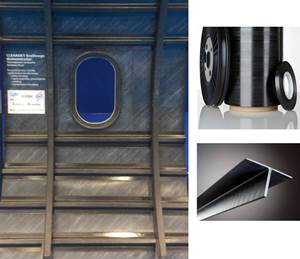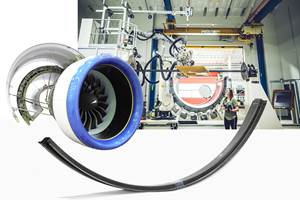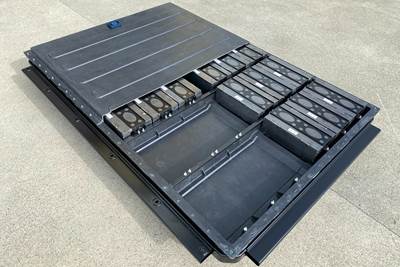Teijin, Applied EV develop composite autonomous vehicle platform
One-piece glass fiber-reinforced SMC structural shell reduces 20% weight and manufacturing complexity of the zero-emissions Blanc Robot platform.
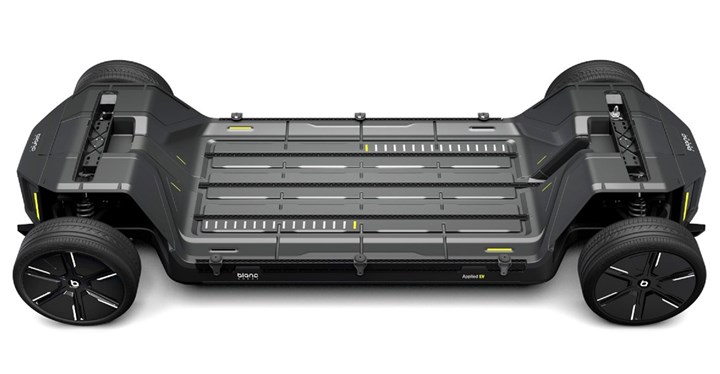
Photo Credit: Teijin Ltd.
Teijin Ltd. (Tokoyo, Japan) announced on Feb. 2 that the company and its joint development partner Applied Electric Vehicles (AEV, Melbourne, Australia) have achieved a major milestone toward a shared vision for zero-emission future mobility with the delivery of a production-ready, one-piece structural shell for Applied EV’s zero-emission robotic vehicle platform, the Blanc Robot.
Launched as a joint development initiative in 2019 to establish a technological foundation for supporting multipurpose zero-emission vehicles for a future society, the Blanc Robot is a programmable, autonomous electric vehicle (EV) platform, designed and engineered by AEV. Built around a core of electronics and mechatronics, running purely on software, it can integrate with many autonomous systems, carry a range of vehicle bodies and serve many purposes, including industrial, delivery and surveillance applications. The Blanc Robot is designed specifically for autonomous operation.
Incorporating Teijin’s lightweight, highly efficient material technology and expertise in composites manufacturing into the platform’s shell component design resulted in the AEV’s ability to significantly reduce the weight and manufacturing complexity of the vehicle, enabling AEV to achieve low mass, high energy efficiency and excellent structural performance.
Both companies are continuing to work together to further utilize Teijin lightweight material technologies for a range of other components, including structural elements, glazing and exterior body panels for use in production EV’s in the latter half of 2022.
The Blanc Robot’s shell, or top cover, is the largest single component on the vehicle, measuring about four square meters in total. It is made from lightweight, high-strength and highly rigid glass fiber-reinforced SMC (GF-SMC) and uses molding technology provided by Continental Structural Plastics (CSP, Auburn Hills, Mich., U.S.), the Teijin Group’s core automotive-composites business. CSP’s proprietary GF-SMC enables the Blanc Robot’s shell to weigh approximately 20% less than an aluminum equivalent component and is said to significantly simplify the manufacturing process.
CSP's molding technology also enables the integral molding of a sheet into thin, complicated shapes that are difficult to achieve using metal. Moreover, molding requires around three minutes. The GF-SMC shell protects the autonomous platform’s crucial equipment inside from damage and the shell achieves excellent fire resistance, dimensional stability and corrosion resistance.
“Our joint development with Teijin is driving product innovation for mobility markets,” says Julian Broadbent, CEO of Applied EV. “Teijin's materials and technology allow us to achieve mass, energy efficiency and cost results that cannot be achieved using more traditional methods. Using GF-SMC for this critical component provided a great deal of design and engineering freedom, which fundamentally changed our manufacturing method and capital cost, allowing us to be more competitive. It also creates a more energy-efficient and sustainable transport solution.”
Applied EV unveiled the Blanc Robot at CES, one of the largest global trade shows to showcase new products and technologies in the consumer electronics industry. Updates of ongoing developments will also be posted on Teijin Mobility Online, an exhibition website introducing Teijin’s mobility-related technologies and products.
“We expect our collaboration with Applied EV to help meet important needs in society by offering new solutions for automotive applications based on advanced materials and structural design required in next-generation EVs,” says Toshiaki Hotaka, general manager, Mobility Division of Teijin Ltd. “Aiming to become a company that supports the society of the future, we have designated environmental value solutions as one of Teijin’s priority fields for contributing to circular economies and sustainability.”
Related Content
The lessons behind OceanGate
Carbon fiber composites faced much criticism in the wake of the OceanGate submersible accident. CW’s publisher Jeff Sloan explains that it’s not that simple.
Read MoreBio-based acrylonitrile for carbon fiber manufacture
The quest for a sustainable source of acrylonitrile for carbon fiber manufacture has made the leap from the lab to the market.
Read MorePEEK vs. PEKK vs. PAEK and continuous compression molding
Suppliers of thermoplastics and carbon fiber chime in regarding PEEK vs. PEKK, and now PAEK, as well as in-situ consolidation — the supply chain for thermoplastic tape composites continues to evolve.
Read MoreThe potential for thermoplastic composite nacelles
Collins Aerospace draws on global team, decades of experience to demonstrate large, curved AFP and welded structures for the next generation of aircraft.
Read MoreRead Next
CSP Advanced Materials Center unveils composite battery enclosure and material innovations
Transition into broader R&D capabilities include honeycomb manufacturing process for ultra-lightweight Class A panels and a full-sized, multi-material battery enclosure featuring a one-piece composite cover.
Read MoreDeveloping bonded composite repair for ships, offshore units
Bureau Veritas and industry partners issue guidelines and pave the way for certification via StrengthBond Offshore project.
Read MoreAll-recycled, needle-punched nonwoven CFRP slashes carbon footprint of Formula 2 seat
Dallara and Tenowo collaborate to produce a race-ready Formula 2 seat using recycled carbon fiber, reducing CO2 emissions by 97.5% compared to virgin materials.
Read More

